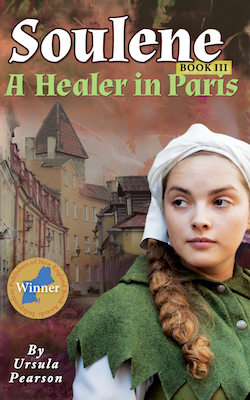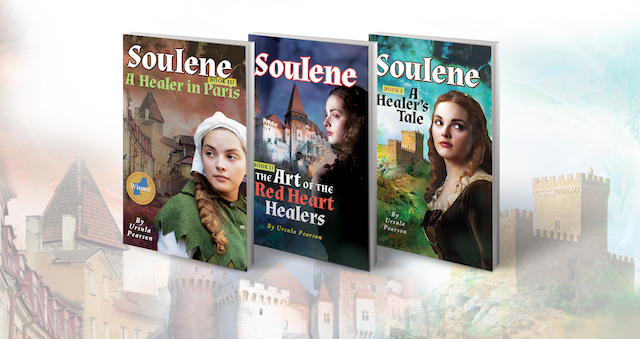 On this blog, I have documented the ups and downs of running an experimental nonfiction publishing venture—i30 Media, which I founded four years ago to publish In 30 Minutes guides. But one thing I seldom mention on this blog or elsewhere is the fact that i30 Media is also a publisher of fiction. I am pleased to announce that one our fiction titles, Soulene: A Healer in Paris, recently received an award from the Independent Publishers of New England for young adult fiction. Congratulations go to author Ursula Pearson, who put in a lot of hard work over a period of several years to tell the story of Soulene, a young healer living in medieval France and England.
On this blog, I have documented the ups and downs of running an experimental nonfiction publishing venture—i30 Media, which I founded four years ago to publish In 30 Minutes guides. But one thing I seldom mention on this blog or elsewhere is the fact that i30 Media is also a publisher of fiction. I am pleased to announce that one our fiction titles, Soulene: A Healer in Paris, recently received an award from the Independent Publishers of New England for young adult fiction. Congratulations go to author Ursula Pearson, who put in a lot of hard work over a period of several years to tell the story of Soulene, a young healer living in medieval France and England.
You may wonder how a publisher of utility nonfiction got involved in publishing YA fiction. I’ve learned that once you hang out your shingle as “publisher” all kinds of people will approach you for help with their work. As the self-publishing explosion has demonstrated, there is an incredible well of untapped writing talent out there. Unfortunately, the process of publishing a book can be difficult. Not only are the tools unwieldy, but also most prospective authors don’t want to deal with the work associated with editing, formatting, designing, and marketing a new book. So they turn to people with more experience to help them get their books published.
While I have said “no” to most prospective authors who have asked me to edit or publish their works of fiction, I made an exception for Ursula. At the heart of her stories was a strong character, a young woman pursuing a passion to help the sick and injured. Soulene lived in an unjust and cruel world, in which poverty, plagues, and war were a constant presence. Only a small class of educated men (most of them from noble families or the clergy) could ever hope to become doctors. Yet Soulene was able to find an alternate path through a religious order for women, the so-called Red Heart Healers, who specialized in working with the poor of France and parts of England.
Soulene also had a fascinating backstory. I won’t reveal it here, but suffice it to say that it rivals a Mexican soap opera for plot twists, villains, and vengeful plots. Ursula also paid close attention to important historical details, including the types of herbs and plants used for treating wounds and illness, the spread of plague in medieval towns, and even the layout of 13th-century Paris.
These qualities, along with the short length of the books, convinced me to take on Ursula’s trilogy. Book 1, Soulene: A Healer’s Tale, was released in 2013. The following year Soulene: The Art of the Red Heart Healers came out. Last year, Soulene: A Healer in Paris, was released. While the first book required a lot of rewrites and editing, by the third book Ursula had hit her stride. The characters were fleshed out, the dialogue was strong, and the pacing was just right. We found talented graphic artists—Steve Sauer and Malgorzata Godziuk—to handle the covers and interior maps. Reader feedback was great, but I also thought there might be an opportunity to get wider recognition.
 Enter the IPNE Awards. Every year the Independent Publishers of New England holds an awards contest, the winners of which are announced at the annual conference. A panel of librarians handles the judging in more than a dozen categories, which include art, literary fiction, mystery, and several nonfiction categories. i30 Media entered Soulene: A Healer in Paris as well as two In 30 Minutes titles. Last month, Soulene was named a finalist in the YA category, and at the conference in Portsmouth New Hampshire it won the IPNE 2016 Book award for YA fiction. It was a pleasure to pick up the award on the author’s behalf.
Enter the IPNE Awards. Every year the Independent Publishers of New England holds an awards contest, the winners of which are announced at the annual conference. A panel of librarians handles the judging in more than a dozen categories, which include art, literary fiction, mystery, and several nonfiction categories. i30 Media entered Soulene: A Healer in Paris as well as two In 30 Minutes titles. Last month, Soulene was named a finalist in the YA category, and at the conference in Portsmouth New Hampshire it won the IPNE 2016 Book award for YA fiction. It was a pleasure to pick up the award on the author’s behalf.
Does the award mean that i30 Media will be developing more fiction titles? I am not sure, but I have told Ursula that when she starts work on another book I will be ready to read her manuscript.
To learn more about Soulene, check out the official Soulene.com website.

 In this blog post, I am going to describe an issue that I spotted in parts of the draft manuscript for Soulene II: Dialogue that doesn’t seem conversational. It happened a few times, usually with new characters whose relationships with established characters hadn’t been fleshed out. I gave Pearson some suggestions on how to turn these one-sided passages into true dialogue, and I am going to share my way of handling it, using an example from the manuscript.
In this blog post, I am going to describe an issue that I spotted in parts of the draft manuscript for Soulene II: Dialogue that doesn’t seem conversational. It happened a few times, usually with new characters whose relationships with established characters hadn’t been fleshed out. I gave Pearson some suggestions on how to turn these one-sided passages into true dialogue, and I am going to share my way of handling it, using an example from the manuscript.